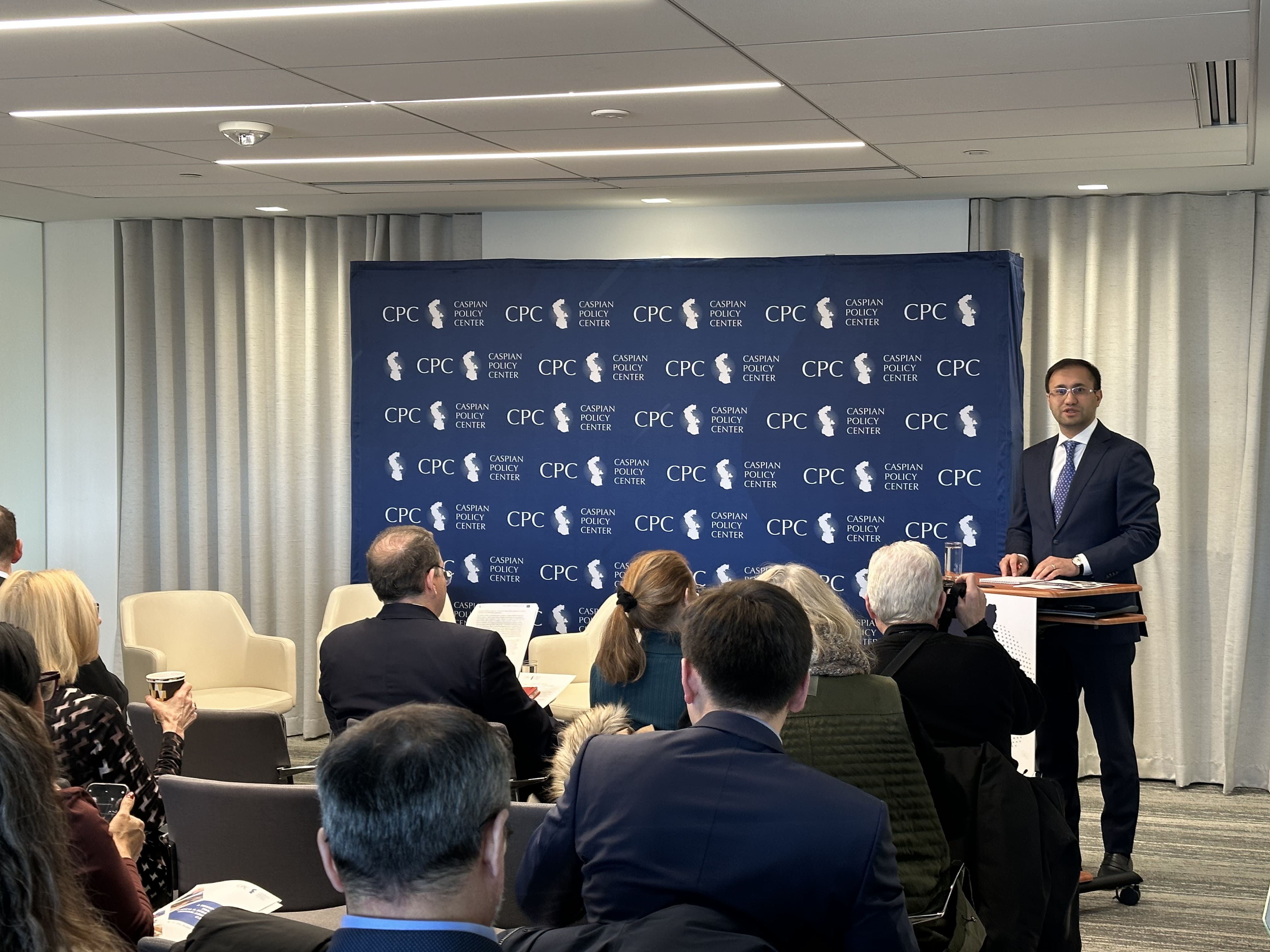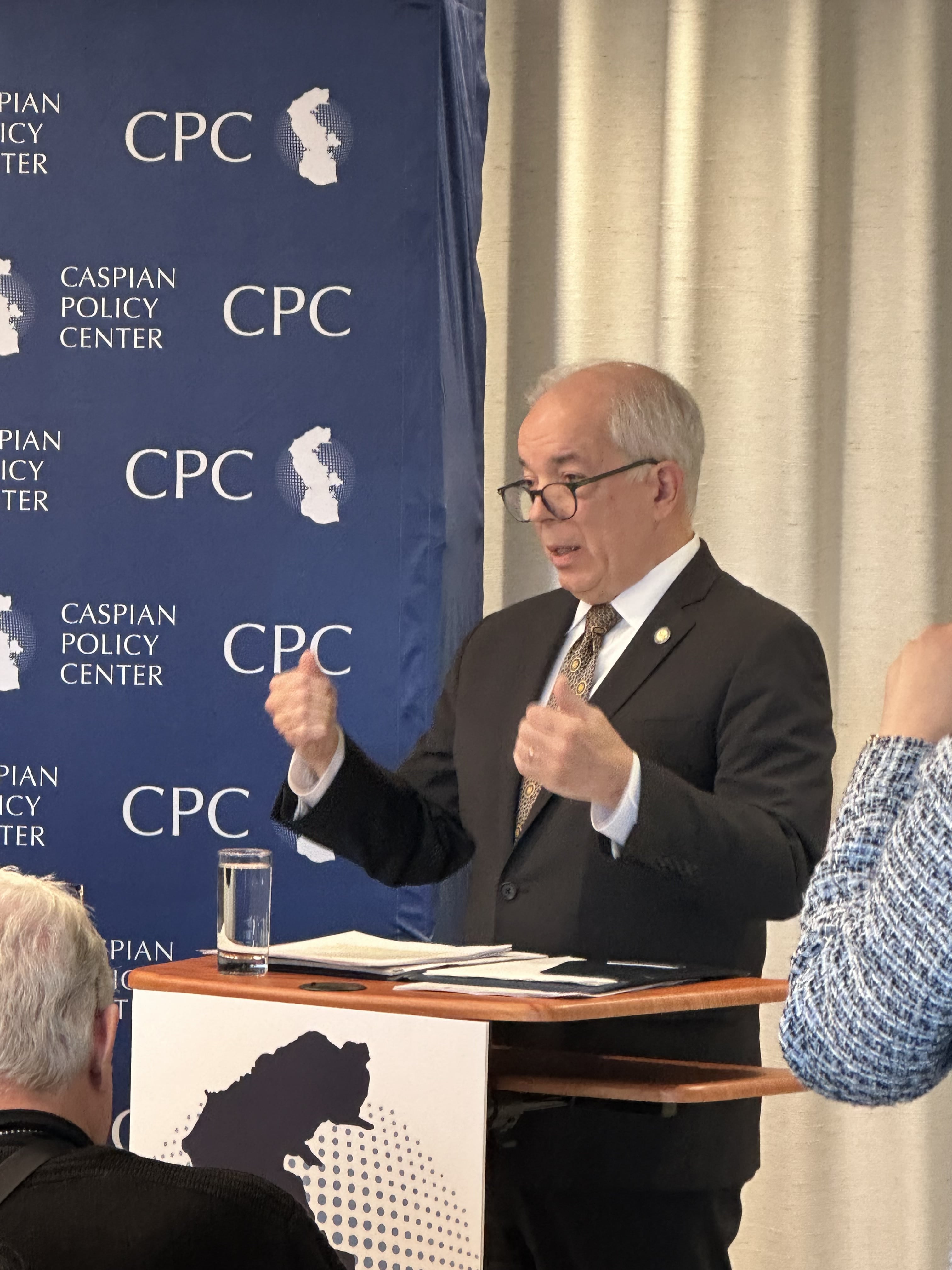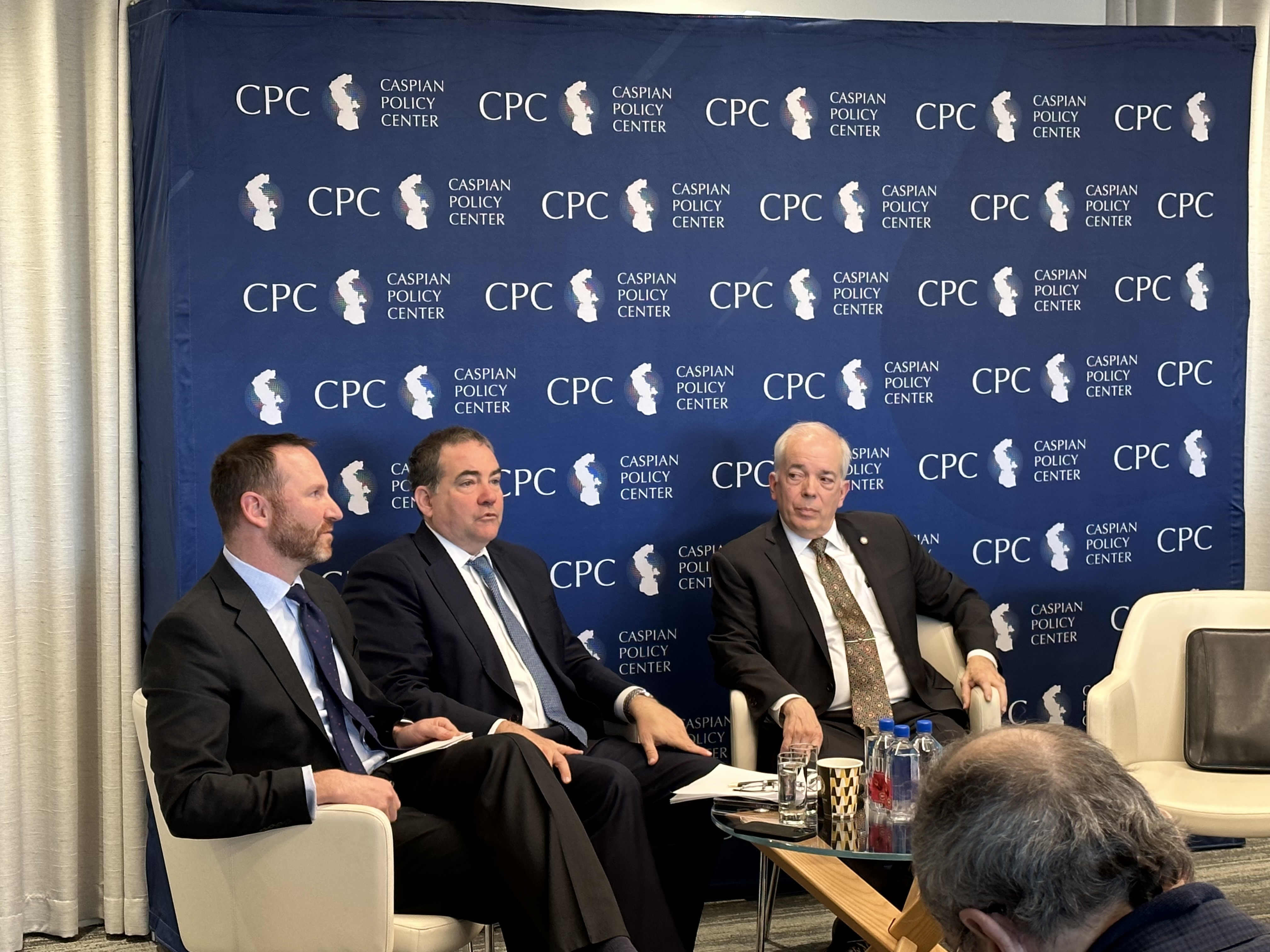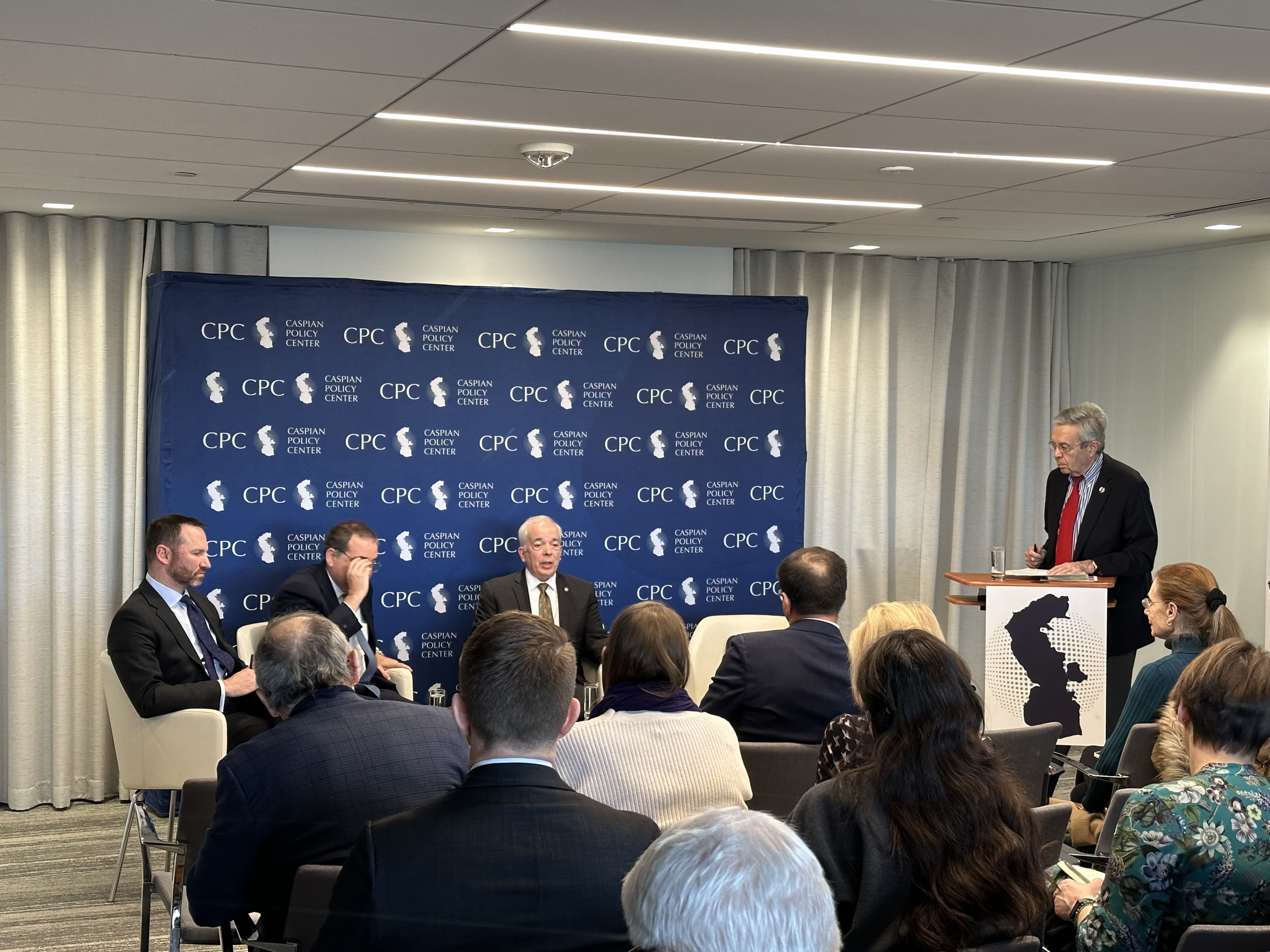A U.S. Strategy for Central Asia and the Caucasus: New Policy for Trump
Recent Articles
Author: Caspian Policy Center
01/15/2025
New strategy proposals for the incoming U.S. administration to successfully work with the countries of Central Asia and the Caucasus were discussed at a January 15, Caspian Policy Center (CPC) event. The CPC event presented a new policy paper, “A Trans-Caspian Trajectory: A New U.S. Strategy for Central Asia and the Caucasus,” written by Senior CPC Fellow Dr. Eric Rudenshiold, followed by discussion moderated by CPC Board Chairman, Amb. (ret.) Richard Hoagland with Senior Center for Strategic and International Studies Vice President Daniel Runde and Senior Hudson Institute Fellow Luke Coffey. The participants discussed recent developments in the Caspian region, potential challenges and opportunities for enhancing cooperation, and the regional implications of increased United States engagement. Discussions explored policy recommendations for the incoming U.S. administration, bringing together diplomats, experts, and specialists, as well as government policymakers.

“Central Asia and the Caucasus have been in the spotlight over the last few years,” said CPC President Efgan Nifti in his opening remarks, adding that, “There is currently much more interest in the region compared to other times, and this interest is only growing.” Nifti emphasized that the Caspian region has been increasingly proactive in diversifying its relationship with global players, which “should be taking a more comprehensive approach to the region.” He noted that the South Caucasus and Central Asia are interconnected and that the United States needs a regional strategy that covers both.
CPC’s Senior Fellow Dr. Eric Rudenshiold presented his policy paper and stated that President Trump is no stranger to the Caspian region, having brought significant attention to Central Asia during his first term, using his Commerce and State Department Secretaries as emissaries with the region on economic reform, as well as having promoted increased energy pipeline connectivity to join Central Asian energy to Caucasus energy streams and pipelines that supply European markets. Commenting on the increased inter- and intra-regional engagement in the Caspian, Rudenshiold highlighted: “Landlocked Central Asia has begun to break out of its infrastructure constraints and heirloom partnerships. It is now reaching across the Caspian to work with Azerbaijan and Georgia, creating a new, rapidly expanding, and booming trade corridor to the West.”

Dr. Rudenshiold then went on to outline U.S. strategic interests in the region, which include: supporting the sovereignty, independence, and territorial integrity of the Trans-Caspian countries; preventing security threats to the U. S. homeland and its global interests, whether from homegrown violent extremists or actors transiting through the region; taking advantage of increasing opportunities for U. S. business and industry to develop trade in this re-emergent, crossroads region; and, encouraging U.S. investment in, development of, and access to the region’s energy and mining sector as part of global energy markets.
In this line, Rudenshiold noted that the normalization of U.S. policy in Central Asia can be a model for integrating a similar approach to engaging with the three Caucasus countries. In addition to presenting his policy recommendations for the incoming U.S. administration, Rudenshiold noted great opportunity for the new U.S. leadership: “Countries in the trans-Caspian region do not seek to jump from one colonial master in Moscow to another in Beijing. Instead, these countries are developing a better sense of agency...and seek alternative partnerships. The door is open for greater U.S. engagement and cooperation, if Washington steps up.”
In his initial remarks introducing the discussants, Amb. Hoagland stated that the United States in the past and most likely into the future has no intention to compete with Russia or China in the region, Instead, he said, “What Washington has always done and does to this very day is conduct full-scale diplomatic relations, including economic and security relations, in every one of these countries, and it is then up to the leadership of these nations to decide what degree of closeness they want to have with the United States.” He added, “I’d note that Kazakhstan, soon after its independence, was probably the first country to understand how this really works and developed a foreign policy that it long called multi-vector, meaning that it is friends with Moscow, Beijing, Brussels, and Washington – all four. Astana takes whatever positive is offered by these partners, but it does NOT, either in public or in private, make one its primary partner. Over the years, nearly every one of the eight countries in the Caspian region has come to follow, to one degree or another, this multi-vector foreign policy.”

The expert panel then addressed areas of opportunity for the United States in the Caucasus and Central Asia regions. Daniel Runde first spoke on the importance of the region regarding its vast critical mineral resource potential. “There is going to be a lot of interest in minerals, and we need a buyer's club for metals,” he said. Runde also emphasized the growing importance of the Middle Corridor as a vital alternative trade route, and Azerbaijan’s role as a key transit point: “My deepest thought from visiting Central Asia this summer is that if we’re going to go big on the Middle Corridor, we’re going to have to learn to love Azerbaijan in a much deeper, more profound way.”

Luke Coffey foused on the two approaches that the United States should take to engage with the political situation in Central Asia and the Caucasus regions: “First, we need to show up in the region and engage more; second, we need to make sure that we help the region balance its regional and international relations. We should make it as easy as possible for the countries that are neighboring Russia and China to work with us.”
The event concluded with a Q&A session, providing an opportunity for further discussion and collaboration among attendees. The CPC Policy Paper can be found below.